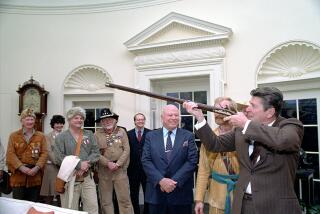Eliot Janeway; Influential Economist, Writer
- Share via
Eliot Janeway, known as “Calamity Janeway” for his propensity toward pessimism when discussing the American stock market, is dead at age 80.
The distinguished economist and popular newspaper and magazine columnist was one of the nation’s most influential voices on the Wall Street-Washington ecosystem. He died Monday at a New York City hospital.
His son Michael said Janeway--critic of administrations as diverse as Franklin D. Roosevelt’s and Ronald Reagan’s--had been ill for some time and inactive because of heart problems compounded by diabetes.
A trained economist who graduated from Cornell University and did graduate work at the London School of Economics during the early years of the Depression, Janeway never espoused a particular school of economics. He said that politics and politicians were a greater influence on economic and stock market trends.
“Political economy is not a science,” he told an interviewer. “It’s a clinical art, like medicine.”
He also studied philosophy in college and told an interviewer for the anthology “Contemporary Authors” that coming to maturity at the height of the Depression convinced him that economics had been transformed “from a subject of study into an obstacle to overcome. I came back (from London) in 1935 and started to pursue it professionally.”
He began disseminating his theories and economic philosophy in a series of articles for The Nation in which he predicted the 1937-38 inventory recession and proposed a huge program of investment in transportation and power equipment to cure it.
Janeway was an informal adviser to Lyndon B. Johnson during Johnson’s career in Congress but broke with him when, as President, he escalated the Vietnam War in 1965.
“I was not arguing against the war itself; that is not my field of expertise,” Janeway said in an interview. “I said that putting it on the back of the economy without raising taxes and instituting controls would bring on disaster.”
He referred to himself in baseball parlance as “a switch-hitter.”
“My approach to economics has always been through politics. . . . I’m the last person who could be accused of practicing economics in any sort of computerized vacuum.”
Through his writings and lectures, Janeway became so well known to Americans that in 1981 he was among a group of celebrities endorsing Smirnoff vodka in a national magazine advertising campaign.
Over the years he worried over the high cost of energy, the future of farm crops and the pitfalls awaiting those who patronize accountants, bankers, tax advisers and even economists themselves.
In his 1983 book “Prescriptions for Prosperity,” he suggested that writers were a better guide to prosperity than any of the above: “Writers are apt to offer shrewder guidelines, especially writers with a flair for cynicism.”
Janeway’s other books include “Struggle of Survival,” a 1951 study of the Roosevelt Administration’s war mobilization policies, and “The Economics of Chaos,” published in 1989, in which he urged the Treasury Department to invest Social Security and other government trust funds more aggressively to generate greater benefits.
He wrote for Time and Fortune magazines in the 1940s and was a columnist for the Chicago Tribune-New York News Syndicate in the 1960s and 1970s. For a time he also was a private consultant and political adviser to Time Inc. publisher and founder Henry R. Luce.
At one time dozens of newspapers across the country carried his column. He also published two weekly economic advisory newsletters.
In addition to Michael, he is survived by his wife, Elizabeth, a novelist; another son, William, and three grandchildren.
More to Read
Sign up for Essential California
The most important California stories and recommendations in your inbox every morning.
You may occasionally receive promotional content from the Los Angeles Times.










